NYCHA Audit Update
The New York City Comptroller is required to audit every City agency at least once every four years to examine the operations of the agency and evaluate the effectiveness of their programs. Since taking office in 2014, New York City Comptroller Scott Stringer has issued 17 audits and investigations regarding NYCHA’s financial and operating practices and has proposed 159 recommendations to improve NYCHA’s operations—more than any other Comptroller. Comptroller Stringer’s office has worked closely with residents and tenant leaders to focus these audits on the issues that matter most to residents. Below are highlights from some of the many NYCHA audits and investigations that Comptroller Stringer’s office has conducted. Comptroller Stringer is committed to supporting the residents of public housing and ensuring that every dollar that NYCHA has is spent effectively.
MAINTENANCE AND REPAIRS
Maintenance and Repair Practices (July 2015)
Comptroller Stringer conducted an audit to examine NYCHA’s maintenance and repair practices, revealing that NYCHA drastically under-reported data on its maintenance backlog, failed to properly train staff to get rid of mold, mildew, and excessive moisture conditions in tenants’ apartments, and fell short in meeting its own deadlines for repairs. In response to this audit, NYCHA acknowledged its failure to adequately address the repair and maintenance needs of its residents and expressed a commitment to addressing its problems. In the years since this audit was conducted, NYCHA has continued to struggle to make necessary repairs in a timely manner. Comptroller Stringer’s office remains committed to holding NYCHA accountable and supporting constituents with open and prolonged maintenance issues.
Maintenance and Inspection of Its Playgrounds (April 2018)
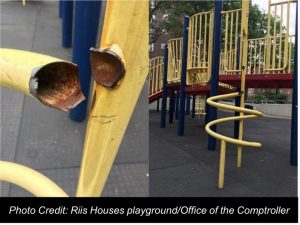 Comptroller Stringer conducted an audit to examine how NYCHA maintains and inspects its 788 playgrounds. This audit found that NYCHA did not have adequate controls over playground inspections and did not ensure that its playgrounds were maintained in a clean and safe manner. Specifically, the audit found unsatisfactory conditions in 70 percent of the playgrounds. In response to this audit, NYCHA agreed to immediately inspect all 788 playgrounds and remedy hazardous conditions. They also agreed to implement a management oversight plan to ensure that development grounds and playgrounds are being inspected monthly in accordance with their own written procedures.
Comptroller Stringer conducted an audit to examine how NYCHA maintains and inspects its 788 playgrounds. This audit found that NYCHA did not have adequate controls over playground inspections and did not ensure that its playgrounds were maintained in a clean and safe manner. Specifically, the audit found unsatisfactory conditions in 70 percent of the playgrounds. In response to this audit, NYCHA agreed to immediately inspect all 788 playgrounds and remedy hazardous conditions. They also agreed to implement a management oversight plan to ensure that development grounds and playgrounds are being inspected monthly in accordance with their own written procedures.
Building Entrance Doors in NYCHA Developments (October 2018)
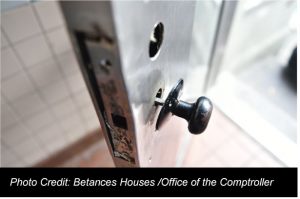 Auditors from the Comptroller’s office visited 299 NYCHA developments throughout New York City to determine the condition of building exterior doors. The auditors examined 4,551 exterior doors and found that more than 1,000 entrance, side, and rear doors were propped open with ropes and chains, had broken latches and missing parts, or were otherwise left unsecured, compromising residents’ security and exposing buildings’ interiors to damaging weather conditions. Based on these findings, the Comptroller’s Office recommended that NYCHA: repair or replace all damaged exterior doors; regularly inspect all exterior doors; ensure that security cameras are operational and located at all publicly accessible entrances and exits; and conduct a top-to-bottom review of its security and maintenance systems and procedures. Since these findings, the Comptroller’s Office has continued to advocate for NYCHA to adopt our recommendations and work with constituents and tenant associations to fix damaged exterior doors.
Auditors from the Comptroller’s office visited 299 NYCHA developments throughout New York City to determine the condition of building exterior doors. The auditors examined 4,551 exterior doors and found that more than 1,000 entrance, side, and rear doors were propped open with ropes and chains, had broken latches and missing parts, or were otherwise left unsecured, compromising residents’ security and exposing buildings’ interiors to damaging weather conditions. Based on these findings, the Comptroller’s Office recommended that NYCHA: repair or replace all damaged exterior doors; regularly inspect all exterior doors; ensure that security cameras are operational and located at all publicly accessible entrances and exits; and conduct a top-to-bottom review of its security and maintenance systems and procedures. Since these findings, the Comptroller’s Office has continued to advocate for NYCHA to adopt our recommendations and work with constituents and tenant associations to fix damaged exterior doors.
Preventive Maintenance and Repairs on the Roofs under Warranty (July 2019)
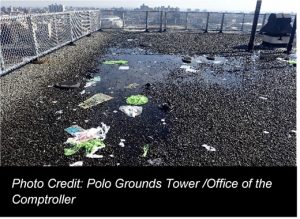 This audit found that NYCHA’s performance of the preventive maintenance and repairs required under its roof warranties was inadequate. Auditors uncovered that NYCHA wasted millions on roof repairs that should have been covered under warranty policies and failed to perform basic oversight and preventive maintenance of roofs, putting the health and safety of thousands of NYCHA residents at risk. This audit offered 27 recommendations for ways that NYCHA could ensure this sort of waste and neglect never happens again. NYCHA agreed with 24 of these recommendations and is in the process of implementing IT enhancements, a new project management system, and electronic document storage which should help NYCHA monitor maintenance and repair of its roofs. We continue to monitor NYCHA’s implementation of our recommendations.
This audit found that NYCHA’s performance of the preventive maintenance and repairs required under its roof warranties was inadequate. Auditors uncovered that NYCHA wasted millions on roof repairs that should have been covered under warranty policies and failed to perform basic oversight and preventive maintenance of roofs, putting the health and safety of thousands of NYCHA residents at risk. This audit offered 27 recommendations for ways that NYCHA could ensure this sort of waste and neglect never happens again. NYCHA agreed with 24 of these recommendations and is in the process of implementing IT enhancements, a new project management system, and electronic document storage which should help NYCHA monitor maintenance and repair of its roofs. We continue to monitor NYCHA’s implementation of our recommendations.
Controls Over Heat Maintenance (May 2020)
This audit found that NYCHA does not have the ability to effectively track the status and resolution of heating complaints involving individual apartments and did not maintain adequate records of required boiler inspections. In response to this audit, NYCHA agreed to: analyze feedback from residents regarding their satisfaction with heating-related work, ensure it sends inventory listings to all of its operational units that work with boilers, and continue developing a tracking system to identify work orders that address deficiencies identified through boiler inspections. The Comptroller’s Office continues to advocate for NYCHA to establish systems that enable it to reliably track the causes and occurrences of heating problems, equipment conditions and deficiencies, and the timing and adequacy of repairs.
HIRING & TRAINING STAFF
Administration of the Section 3 Program (August 2014)
 The Comptroller’s office audited NYCHA’s administration of the Section 3 program and found that NYCHA failed to ensure that contractors working on its capital projects complied with federal law and NYCHA’s own regulations that mandate hiring of NYCHA residents and low-income New Yorkers. As a result, public housing and low-income New Yorkers lost out on hundreds of thousands of dollars in potential wages. As a result of our audit, NYCHA restructured their oversight process as it relates to hiring and re-training staff responsible for reviewing hiring summaries.
The Comptroller’s office audited NYCHA’s administration of the Section 3 program and found that NYCHA failed to ensure that contractors working on its capital projects complied with federal law and NYCHA’s own regulations that mandate hiring of NYCHA residents and low-income New Yorkers. As a result, public housing and low-income New Yorkers lost out on hundreds of thousands of dollars in potential wages. As a result of our audit, NYCHA restructured their oversight process as it relates to hiring and re-training staff responsible for reviewing hiring summaries.
APARTMENT TURN-OVER
Management of Vacant Apartments (June 2015)
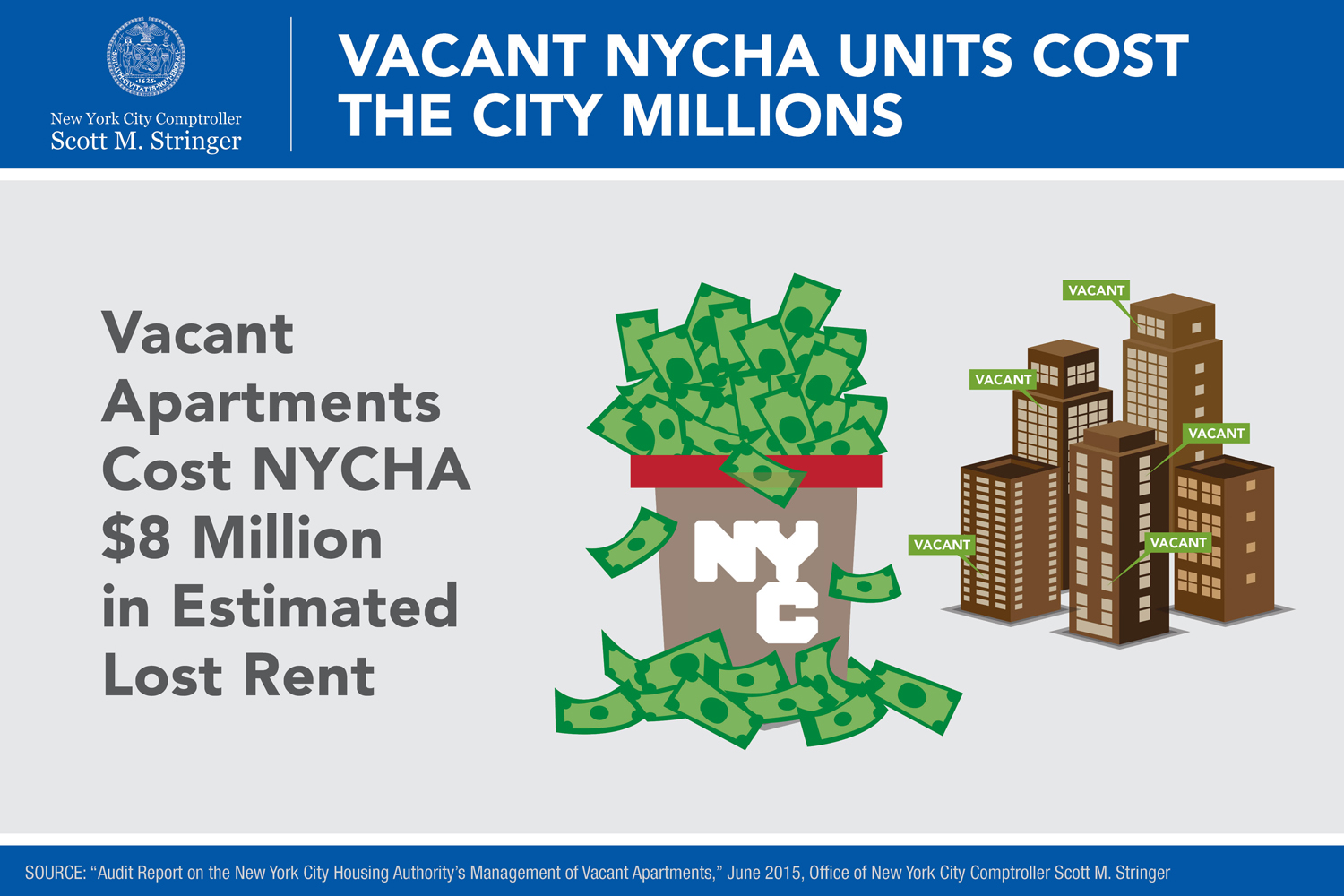 Comptroller Stringer’s office audited NYCHA’s management of vacant apartments to see if there was adequate monitoring and tracking of empty units. The audit found that NYCHA did not ensure that vacant apartments were repopulated with new tenants in a timely manner. Vacant apartments that didn’t need renovations took an average of 116 days to fill instead of 40, which is NYCHA’s goal. Apartments in need of major repairs remained off the rent rolls for an average of 7 years. Moreover, NYCHA did not consistently monitor empty units, increasing their susceptibility to vandalism and squatters. To improve tracking of vacant apartments and ensure they were offered to potential tenants sooner, NYCHA agreed to continue its efforts to minimize the time apartments remain vacant and institute regular inspections by property management of vacant apartments.
Comptroller Stringer’s office audited NYCHA’s management of vacant apartments to see if there was adequate monitoring and tracking of empty units. The audit found that NYCHA did not ensure that vacant apartments were repopulated with new tenants in a timely manner. Vacant apartments that didn’t need renovations took an average of 116 days to fill instead of 40, which is NYCHA’s goal. Apartments in need of major repairs remained off the rent rolls for an average of 7 years. Moreover, NYCHA did not consistently monitor empty units, increasing their susceptibility to vandalism and squatters. To improve tracking of vacant apartments and ensure they were offered to potential tenants sooner, NYCHA agreed to continue its efforts to minimize the time apartments remain vacant and institute regular inspections by property management of vacant apartments.
Tenant Selection Process (June 2018)
Comptroller Stringer conducted an audit of NYCHA’s Tenant Selection Process to examine if the proper procedures were followed regarding applicants on certified waiting lists and new applicants awarded apartments. The audit found that NYCHA had limited assurance that the applicants who were offered apartments, and their household members, had been properly screened prior to their moving in. For example, NYCHA did not maintain adequate documentation to demonstrate that the required criminal and sex offender background checks and post-selection/pre-offer Enterprise Income Verification (EIV) searches were conducted and accurately reported. In response to this audit, NYCHA agreed to implement improvements to their screening processes including ensuring that the required criminal and sex offender background checks are maintained, and post-selection/pre-offer (EIV) searches are done consistently and documented appropriately.
EMERGENCY PREPAREDNESS (December 2015)
Comptroller Stringer conducted an audit on NYCHA’s Emergency Preparedness plans. This audit found that NYCHA’s emergency preparedness plans contained significant issues that could jeopardize its ability to handle emergency situations and quickly restore the agency to a normal level of operation. Specifically, it found that NYCHA’s Emergency Procedures Manual did not properly define emergency management leadership; adequately identify who would be in charge in the event of an emergency situation; include a communication plan that specifies how critical information will be sent to employees, residents, and other stakeholders; and include identification of its resources, critical services and operations, and community groups that could potentially assist with emergency response. Further, it found that NYCHA did not maintain accurate information on disabled tenants in its Tenant Data System and that NYCHA’s Property Managers did not maintain complete lists of tenants with physical disabilities. In response to this audit, NYCHA said it had enhanced emergency management programs to plan for, manage, and recover from major disasters. At the time we raised concerns that their reformulated plans did not adequately address the findings of our audit and since then have continued to call for improvements.
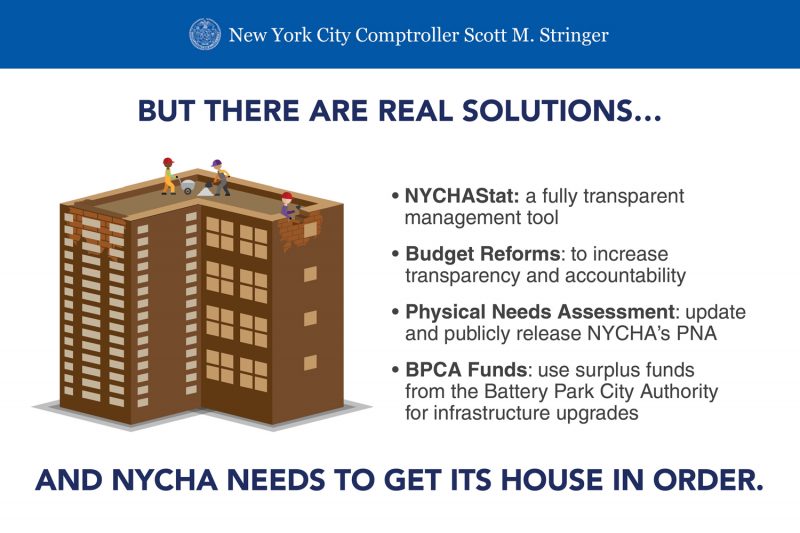 Comptroller Stringer’s 17 audits and investigations of NYCHA have revealed system-wide deficiencies in the maintenance of roofs and playgrounds, and tens of thousands of backlogged repairs and unremedied safety violations. While there is still much work to be done, our work has resulted in changes to the ways NYCHA hires and trains their staff and maintains and manages their properties. Our office continues to advocate for all our recommendations to be adopted.
Comptroller Stringer’s 17 audits and investigations of NYCHA have revealed system-wide deficiencies in the maintenance of roofs and playgrounds, and tens of thousands of backlogged repairs and unremedied safety violations. While there is still much work to be done, our work has resulted in changes to the ways NYCHA hires and trains their staff and maintains and manages their properties. Our office continues to advocate for all our recommendations to be adopted.
Contact Us
We are committed to working in partnership with NYCHA residents. If you would like to offer ideas for audits to save money or improve NYCHA efficiency, you can call (212) NO-WASTE.
If you are in need of constituent services, our Community Action Center is here to help:
? action@comptroller.nyc.gov ? (212) 669-3916.
Additionally, we encourage you to reach out to our NYCHA Manager, Nina Saxon, at nsaxon@comptroller.nyc.gov.